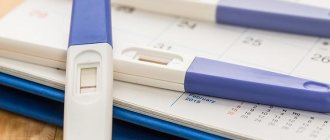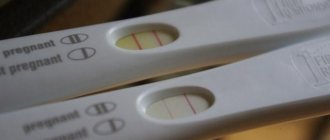In what cases does the test not show pregnancy: reasons
So, thousands of women turn to search engines with the question of whether it happens that the test does not show pregnancy. And we will answer this question right away: yes, it happens, and quite often too - much more often than the other way around, when the test shows a non-existent pregnancy. But why this happens is not so easy to find out. There are a variety of reasons.
The test does not show pregnancy before the delay
All home tests are built and work on the same principle: they contain a reagent that reacts with a specific hormone - hCG (human chorionic gonadotropin). If a woman is healthy, then normally a very small amount of hCG may be present in her body. The level of this hormone begins to increase rapidly only after conception, because it is actively produced by the future embryo.
In the first days after conception, the concentration of the hCG hormone doubles every two days. Initially, it rises in the woman’s blood, and after a few days it becomes quite high in the urine. The test is able to detect the presence of the hCG hormone in a woman’s urine about two weeks after fertilization.
Considering that ovulation in most cases occurs approximately in the middle of the cycle, there is no point in performing the test earlier than after the delay has occurred: by this time it will be possible to determine the presence or absence of pregnancy using this home method. Doctors urge women to do testing only 2-3 days late or even later. And at the same time they warn: all previously conducted studies may turn out to be unreliable .
However, in practice, a huge number of women carry out a pregnancy test before the delay. And in fact, he often shows a true result. And we are already so accustomed to this that we consider early testing to be the norm. Meanwhile, even in the instructions for the most highly sensitive tests, which can be carried out even before the delay and at any time of the day, it is recommended to do the test only after the delay. Otherwise, the annotation warns, the reliability of the results is significantly reduced.
If the test does not show pregnancy before the delay, then this is the reason that should be suspected first: testing too early. Add to this the possibility of late ovulation in the last cycle, and it is better not to panic prematurely. Wait for your period, and if it is absent, repeat the test on the 2-3rd day of the delay, and then again a week later .
Why does the test not show pregnancy, but there are signs?
The closer you get to the expected start of your period, the more you feel nauseous, your mood changes more often, and your nervousness becomes stronger. The list of sensations that a woman can experience in the first days after conception is very long. But it should be recognized that all of them with the same degree of probability may turn out to be premenstrual syndrome. Reproduction specialists very often observe a picture where women trying to get pregnant look out for mythical early signs of pregnancy in almost every cycle and conduct many tests. There is even the concept of “false pregnancy,” when, due to psychological attitudes, a delay actually occurs. Girls whose plans do not at all include getting pregnant behave in a similar way: because of fear, they are able to see signs where there are none.
Dear ladies, in any case, you should put your emotions aside and assess the situation as objectively as possible: nausea, dizziness, irritability and drowsiness can have thousands of other reasons that are completely unrelated to pregnancy. It is better to never set yourself up for a specific result and not draw hasty conclusions. In a word, signs of pregnancy may not turn out to be such at all - keep this in mind . In addition, today women are increasingly experiencing hormonal imbalances, which can be caused by the slightest stress.
However, the more days the delay lasts, the more suspicion turns into confidence. There is only one thing that confuses me: although there is no period, the test still does not show pregnancy.
The test does not show pregnancy, but there is a delay
Always remember that there may not actually be a pregnancy, no matter how much you are sure of it. Hormonal imbalances in women occur quite often; the menstrual cycle may well get confused and move forward by several days, and there are a number of reasons for this - from illness to changes in weather or climate.
But, of course, even with repeated tests that show a negative result, pregnancy can occur.
Test results that do not indicate an existing pregnancy are called false negatives. The instructions for any test usually indicate in what cases and for what reasons the test may not show a pregnancy that actually exists. Most often these reasons are as follows:
- Testing too early (as we already discussed above): the level of hCG in the urine is not yet high enough to be detected by the test reagent.
- Violation of testing rules. Each package contains simple, understandable, detailed step-by-step instructions on how to properly conduct testing. If it is a strip, then it must be immersed in urine strictly to the indicated mark. If the cassette says to apply 3 drops to the display, then do just that. In addition, the container for collecting urine must be sterile, and the test results should be read after and no later than the time specified in the instructions.
- Poor quality test. Despite, or maybe even due to the availability of a huge variety of tests from different companies in pharmacies, not all of them are of equal quality. And price here may not always be an indicator of quality. Girls often share their experience that it was the simplest, cheapest test that was the first to show pregnancy, while the “sophisticated” one was wrong. In addition, keep in mind that the test may have been stored improperly and always check its expiration date.
- "Diluted" urine. To maximize the reliability of the result obtained during testing, it is best to carry out diagnosis using the first portion of morning urine. It is considered the most concentrated (unless you drank all night and went to the toilet tirelessly), which means it may contain the most hCG hormone. In this regard, also keep in mind that taking diuretics and consuming foods/drinks that have a diuretic effect may affect the test result: it may not detect the hCG hormone in very “diluted” urine.
- Late ovulation in the last menstrual cycle or late implantation of a fertilized egg. If the egg matures later than expected, or after fertilization it takes longer than usual to reach the uterus, then due to its delayed implantation, hCG will begin to be actively produced a little later - and the test, accordingly, will later be able to show pregnancy.
- Heart or kidney disease. In some diseases of the cardiovascular or urinary systems, the hCG hormone is not produced in sufficient quantities or is not able to penetrate into the urine, which causes a false negative result. If you have chronic pyelonephritis, or you have recently been seriously ill, then it is likely that the test will not show pregnancy.
- Disorders during pregnancy in which an insufficient amount of the hCG hormone is produced, which is why the “test” does not detect pregnancy. This could be an ectopic pregnancy, a frozen pregnancy, or abnormalities in the development of the fetus. Low hCG levels are observed when there is a threat of miscarriage.
We would like to draw your attention to the fact that most often the reasons that the test does not show pregnancy, when there are both signs and a delay, are quite harmless. It’s just that the process of ovulation and implantation of the fertilized egg in each individual case may have its own characteristics.
The last reason we talked about—the onset of a pathological pregnancy—is much less common. But this possibility still needs to be excluded. Therefore, if you do not have your period on time, even if the test does not show pregnancy, it is recommended to visit a gynecologist . Perhaps he will refer you for a blood test for hCG or an ultrasound, which will allow you to find a more accurate answer to your question.
How long can a test not show pregnancy?
The modern woman is no longer satisfied with such “early diagnosis”, when she finds out about pregnancy even before the appearance of a visible tummy. Today, everyone, without exception, wants to get an answer to an exciting question a few years before the delay. That’s why they start conducting pregnancy tests too early. There are often cases when a woman manages to conduct about a dozen tests, or even more, before two true lines appear.
We urge you not to force things for another reason: in some cases, the test may not show pregnancy for a very long time. Several weeks (from one to three) is the average. But in some cases we are talking about months! At the same time, a baby develops safely in the woman’s womb, so carefully hiding its existence from its mother. Moreover, sometimes even hCG and ultrasound are not able to discern pregnancy in the first weeks of its development, despite the fact that there are no pathologies .
You should never rely solely on test results, even if they showed the result you expected the first time. Only a gynecological examination and further examinations can put a final point or an ellipsis after which “to be continued.” Therefore, there is simply no point in deliberately setting yourself up for a specific result: unnecessary worries do not solve anything, and in the event of pregnancy, they are also not safe.
Especially for - Elena Semenova
Early diagnosis
The most common factor explaining why a false-negative pregnancy test occurs is diagnostics performed too early in pregnancy. Normally, the content of chorionic gonadotropic hormone by the time the delay is detected has already increased so much that it becomes easy to establish conception. But sometimes in the first days of gestation these indicators remain quite low, then the test shows a negative result.
- Every girl knows the date of her upcoming period if her cycle is regular and functions like a clock. But with an irregular cycle or the presence of any pathology, it can be quite difficult to determine the delay.
- Sometimes, even during a normal cycle, shifts in ovulation can occur, then if there is a delay, the gestation period will be calculated in several days, the hCG will not have time to reach a detectable level. In such a situation, there is a high probability that testing will show pregnancy if the test is negative.
- HCG begins to be produced in the body from the first day of implantation. It will be possible to detect this hormonal substance in urine after a few days, but for now in low concentrations.
- As for the timing, the gonadotropic hormone is detected in the bloodstream a week after conception, and in urine - after one and a half to two weeks.
At first, hCG during pregnancy grows quite rapidly, but when the placental tissues are finally formed, they take over the functions of producing hormonal substances, so the growth rate of chorionic hormone decreases.







